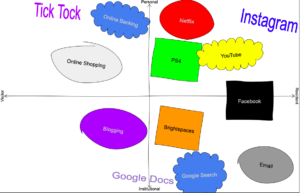
What digital platforms are students currently using to develop their professional network?
There are countless digital platforms that students use to develop their professional networks. Some of those platforms include Facebook, Instagram, Linkedin, Twitter, and many other ones. Students use these applications to enhance their professional appearance when online by not only looking professional in their profile pictures but in the way they write and how they are perceived by anyone who stumbles across their profile. Keeping a professional identity when using online platforms is extremely important as anyone can look you up online. For example, I personally limit the amount that I post or share about my private life on my social media accounts. By doing this, I am ensuring that I limit the amount of information that can be found on me, especially if that information should be kept to myself.
Aside from limiting the amount of information that I make public about myself, there is certain information that I do give to people to build my professional network. I regularly update my information on my LinkedIn and Facebook profiles to keep people informed of my general interests and I post appropriate photos of myself. By allowing others to get to know my general interests and sharing limited information about myself, I appear as a nice, put-together young man.
Despite being in school, I work 3-4 days a week where I am an assistant manager at Dairy Queen. Working during school has been difficult, but it has been quite a learning curve as I have found a balance between my work, school, and everyday life. Along with working, I am consistently contributing monthly to my RRSP as I am excited to see what the future holds for me. At times it is hard to give up the money I am contributing to the account, but with time I am certain that it will be all worth the time and effort.
What can you (as a student) consider to expand your professional learning network?
There are numerous ways that a student can expand their professional learning network. The simplest way to expand a professional learning network is by creating professional social media accounts. By creating skillful social accounts, students can ensure that they are being seen for who they want to be seen as. This can be done by making a personal profile that lists all of the qualifications that a student has. Personally, my professional account would be my Linkedin profile; this is because on this network I list my qualifications, what I am interested in, and list my accomplishments. I believe that Linkedin is necessary for all post-secondary students as it is a professional platform that portrays an individuals professional learning network.
In your network, how can you create a digital identity/reputation?
Digital identity is created by everything that an individual accesses on the world wide web. With that being said, anytime you access a website or share a post, it is recorded and contributes towards your digital identity. Creating a digital reputation can work in your favour, or against you, depending on what an individual accesses most frequently. Personally, I make sure that anytime I am sharing a post, liking a picture or posting any content, I make sure that it reflects who I am and what I am passionate about. Although, there is a fine line of what information to be cautious of as a digital reputation can at times be a reputation for all the wrong reasons. For instance, I am careful not to be liking or accessing content that is considered cruel or offensive. On the contrary, doing things like sharing appropriate videos, or liking photos of friends and family is the kind of things that contribute to creating a positive digital reputation. When done properly, you can create a positive digital identity that all will be acceptable for both your personal and professional life.
Consider what a local employer would do if you applied for a job with them – can they search the content, is it of benefit to the career path, does it hinder the opportunity of employment?
Currently, I work at Dairy Queen where I am an assistant manager and am involved with screening applicants. How I help with this process is I search up the social media accounts are given on the resume of the applicant (usually Linkedin or Facebook). By going over these social media platforms, I get a decent understanding of who the person is and at times it can make or break someones chances of getting hired. After viewing these accounts, I will always search their name on the internet to see if any other accounts or information comes up on this individual. When seeing what the internet has to say about someone, you get to know who they are unprofessionally, which at times is vastly different than how they are portrayed in a Linkedin profile. Currently on my resume, I have my Linkedin and Facebook profile attached so an employer can see my qualifications and see that I keep my social media accounts professional.
Not only can there be negative information that you find on people when searching them up online, but at times employers can find information that makes them be more appealing as an applicant. Online, there are sometimes achievements of the individual you are researching on that can make them more attractive to hire for our available position. When using social media appropriately and professionally, there is no doubt that social media is a problem for people. This is why it is always important for students to keep in mind that social media is out there for everyone to see what you are doing , nothing is private anymore.
Leave a Reply